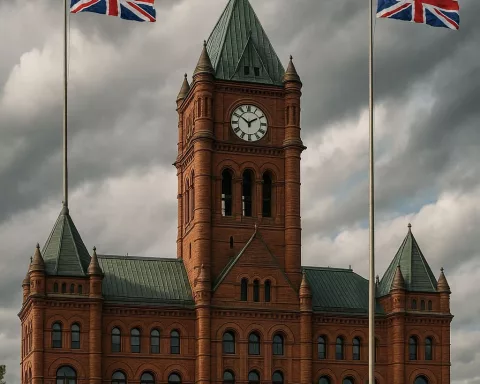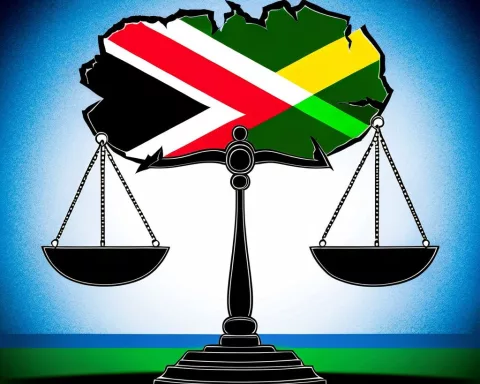The African Christian Democratic Party (ACDP) has joined the Democratic Alliance (DA) in their Multi-Party Charter, which aims to challenge the African National Congress (ANC)-led government in the upcoming elections. The charter also includes other parties such as the Inkatha Freedom Party (IFP), Freedom Front Plus (FF Plus), ActionSA, United Independent Movement (UIM), and Social National Party (SNP). The DA and other party leaders have been engaging with the ACDP, and a recent study tour to Germany provided valuable insights into successful models of inter-party cooperation and coalition-building. Civil society organizations have also joined the movement, aiming to mobilize voters and bring about change in the next elections.
What is the Multi-Party Charter in South Africa and why is the African Christian Democratic Party (ACDP) joining it?
The Multi-Party Charter is a collaborative initiative led by the Democratic Alliance (DA) and other parties to challenge the African National Congress (ANC) in the upcoming elections. The ACDP’s recent decision to join the Charter adds to the number of like-minded parties to eight, aiming to form a credible alternative capable of winning the elections. The DA and other leaders have been engaging with the ACDP, and a recent study tour to Germany provided valuable insights into successful models of inter-party cooperation and coalition-building.
A New Political Alliance Emerges
Recently, a significant shift has occurred in South Africa’s political landscape with the African Christian Democratic Party (ACDP) announcing its decision to join the Democratic Alliance (DA) in their Multi-Party Charter. The objective of this alliance is to challenge the African National Congress (ANC)-led government in the upcoming elections. DA Federal Leader John Steenhuisen revealed that the ACDP’s participation has increased the number of like-minded parties in the Charter to eight.
The Multi-Party Charter is a collaborative initiative led by the DA, comprising other parties such as the Inkatha Freedom Party (IFP), Freedom Front Plus (FF Plus), ActionSA, United Independent Movement (UIM), and Social National Party (SNP). Steenhuisen mentioned that the DA and other leaders have been consistently engaging with the ACDP over the past few months, addressing questions and concerns about the project. Consequently, the ACDP has decided to join the Charter in a bid to form a credible alternative capable of winning the upcoming elections.
Learning from German Coalition Experiences
In addition to the ACDP’s inclusion, Steenhuisen cited a recent study tour to Germany by party leaders as another significant factor strengthening the opposition alliance. The visit allowed leaders to delve into the complexities of inter-party cooperation and investigate various coalition configurations based on different election outcomes. Furthermore, they examined how diverse regional coalitions interact with a national coalition government while managing individual party campaigns without compromising post-election collaboration.
The study tour in Germany provided valuable insights to the party leaders, allowing them to objectively observe and evaluate the processes in place and consider potential lessons applicable to their own situation. Steenhuisen highlighted the importance of such experiences in fostering closer personal bonds and more open reflections among fellow party leaders.
Civil Society Organizations Join the Movement
The third development fueling Steenhuisen’s optimism is the recent convergence of numerous civil society organizations under the #Convergance4SA summit. These organizations have come together to explore avenues for cooperation and coordination, with the intention to mobilize voters to register and vote for change in the upcoming elections. Steenhuisen expressed his delight at this development, as it truly promises to galvanize diverse segments of South African society into united action.
The establishment of the Multi-Party Charter and the ACDP’s participation indicate a strategic shift in South African politics, as opposition parties unite to challenge the ANC’s long-standing dominance. Through the study tour to Germany, the leaders acquired valuable insights into successful models of inter-party cooperation and coalition-building, which may prove crucial in the upcoming elections.
Momentum Builds for a United Front
As momentum builds with the #Convergance4SA summit and the ongoing collaboration among various political parties and civil society organizations, South Africa is witnessing a growing wave of collective action. This movement aims to mobilize voters and bring about change, ultimately striving to offer a credible and united alternative to the ANC in the next elections.
In the coming months, South Africa’s political landscape is set to undergo a significant transformation, led by the Multi-Party Charter. The alliance’s success will rely on the ability of its members to maintain strong collaboration, transparency, and a shared vision for the nation’s future. The ACDP’s decision to join the Charter signifies a critical milestone in this journey, as it opens up the possibility for further expansion and increased support from various segments of society.
1. What is the Multi-Party Charter in South Africa, and why is the African Christian Democratic Party (ACDP) joining it?
The Multi-Party Charter is a collaborative initiative led by the Democratic Alliance (DA) and other parties to challenge the African National Congress (ANC) in the upcoming elections. The ACDP’s recent decision to join the Charter adds to the number of like-minded parties to eight, aiming to form a credible alternative capable of winning the elections.
2. Which other parties are part of the Multi-Party Charter?
The Multi-Party Charter comprises other parties such as the Inkatha Freedom Party (IFP), Freedom Front Plus (FF Plus), ActionSA, United Independent Movement (UIM), and Social National Party (SNP).
3. How did the DA and other leaders engage with the ACDP regarding the Multi-Party Charter?
The DA and other leaders have been consistently engaging with the ACDP over the past few months, addressing questions and concerns about the project.
4. How did the recent study tour to Germany strengthen the opposition alliance?
The study tour allowed leaders to delve into the complexities of inter-party cooperation and investigate various coalition configurations based on different election outcomes. Furthermore, they examined how diverse regional coalitions interact with a national coalition government while managing individual party campaigns without compromising post-election collaboration.
5. What insights did the party leaders gain from the study tour?
The study tour in Germany provided valuable insights to the party leaders, allowing them to objectively observe and evaluate the processes in place and consider potential lessons applicable to their own situation.
6. How is civil society involved in the movement to establish a united front against the ANC?
Numerous civil society organizations have come together under the #Convergance4SA summit to explore avenues for cooperation and coordination, with the intention to mobilize voters to register and vote for change in the upcoming elections.
7. What is the significance of the ACDP’s decision to join the Multi-Party Charter?
The ACDP’s decision to join the Charter signifies a critical milestone in the journey to establish a united front against the ANC. It opens up the possibility for further expansion and increased support from various segments of society.
8. What does the success of the alliance depend on?
The alliance’s success will rely on the ability of its members to maintain strong collaboration, transparency, and a shared vision for the nation’s future.












